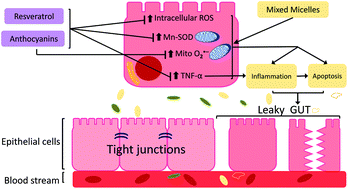Differential protection by anthocyanin-rich bilberry extract and resveratrol against lipid micelle-induced oxidative stress and monolayer permeability in Caco-2 intestinal epithelial cells†
Abstract
Excess dietary fat, and associated bile acids, can impair intestinal barrier integrity, produce intestinal or systemic inflammation and promote tumorigenesis. Dietary polyphenols in foods such as berries display antioxidant and other protective effects in many biological systems, but little is known about their protective effects on intestinal epithelial cells exposed to dietary fat. In a Caco-2 cell model of dietary fat-induced intestinal epithelial cell cytotoxicity, oxidative stress and barrier impairment, we investigated the relative protection afforded by an anthocyanin-rich bilberry extract (ARBE) or resveratrol. Exposure of the cells to mixed micelles (MM) of fatty acids and bile acids for 24 h markedly increased intracellular reactive oxygen species (ROS) and mitochondrial superoxide generation, decreased cell viability, increased expression of TNF-α mRNA and disrupted differentiated monolayer integrity. Starting prior to exposure to MM, treatments with ARBE or resveratrol, at polyphenol concentrations from 1.25–20 μM, strongly attenuated MM-induced intracellular ROS generation, and ARBE but not resveratrol decreased mitochondrial superoxide generation. Both ARBE and resveratrol inhibited the MM-induced expression of TNF-α mRNA. In assessments of differentiated monolayer integrity by transepithelial electrical resistance (TEER) and paracellular permeability, resveratrol protection was apparent at 3 h of MM exposure, but less at 6 h and absent by 9 h. In contrast, ARBE largely reversed MM-induced impairment by 9 h, with TEER values reaching 82% of control and the MM-induced paracellular permeability reduced by 78%. While they appeared to act differently, the results suggest that dietary sources of anthocyanins and resveratrol can help confer resistance of intestinal epithelial cells to oxidative stress and inflammation, and resultant barrier dysfunction and tumorigenesis, induced by high dietary fat common in the Western diet.



 Please wait while we load your content...
Please wait while we load your content...